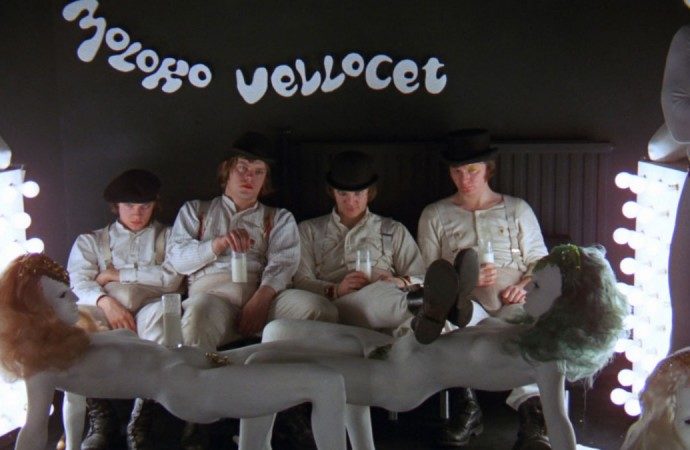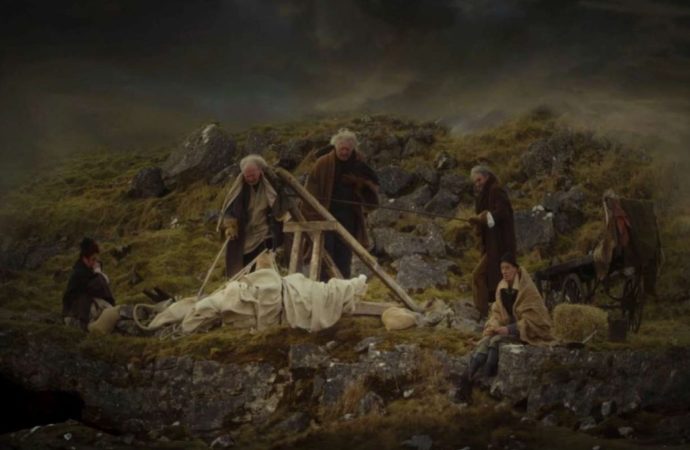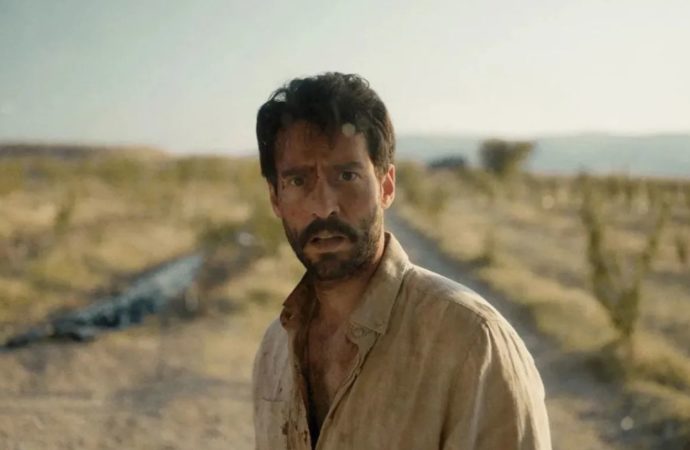Free will is a subject that comes in handy, as Cassen would say in Amanece que no es poco, when talking about A Clockwork Orange. Stanley Kubrick is a staunch defender of it, considering that it is better, or less bad, for there to be a psychopath capable of doing the atrocities that Alex does in the film than for there to be a repressive state that prevents him from choosing between good and evil, that moral choice that makes us human. If man does not choose, he ceases to be a man, becoming a mechanical orange, something that looks like an orange, but is not.
Stanley Kubrick’s ninth film is, as well as a lecture on free will, fascinating in every frame, from the moment it begins and the camera introduces us to Alex and his Drugos, starting with a close-up of Malcolm McDowell, the actor who played Alex, and opening the shot to show us his Drugos and the place where they drink, the Korova Milk Bar, an absolute reference of pop art, where naked mannequins of women serve as tables and decoration. Then Alex begins to tell his story and, from that moment on, fascination will be accompanied by a feeling of unease. This is the most controversial and controversial film of Kubrick’s career, one of the most problematic films ever released by a director as well known as the creator of 2001: A Space Odyssey.
That treatment of women will not change with the flesh-and-blood ones, who will also be objects with which to practise the old “in-out-in-out”, possibly combined with some ultra-violence. This is what led the prestigious critic Pauline Kael to call it pornographic and to say that Kubrick used a trick to make the victims of Alex’s attacks have less human traits than he does, making the viewer feel no empathy for them. But I think, this time, Kael was wrong.
It is true that many have seen in A Clockwork Orange a glorification of violence and of Alex himself, but it should not be forgotten that Kubrick, and Anthony Burgess in the novel on which the film is based, tell the story from Alex’s point of view. It is true that this makes it very dangerous, because it can give the impression that the director is with Alex, the only character, despite being a murderer and rapist, with a certain charisma, humour and sympathy in the whole film, but I repeat the film is told by Alex himself, it is normal that his character comes out well and the rest does not, we are seeing the story through his eyes, hearing it through his ears and he tells it to us in the first person, remembering the eyes, ears and mouth of a psychopath.
The fact is that Kubrick shoots it so wonderfully well that he makes us feel a little guilty, experiencing through Alex, if we get Freudian, our most repressed wild impulses. Moreover, Kubrick, always delighting in the macabre, makes it easy for us, the victims are vulgar objects of desire, the women, or undesirable individuals, like the tramp who won’t hesitate to take revenge into his own hands, or the writer who we end up seeing in ecstasy while he tortures “poor” Alex. The film is pure black humour from a known misanthrope like Kubrick, and it is only natural that it was so wonderful to that other known misanthrope Luis Buñuel that he would end up saying that A Clockwork Orange is my current favourite. I was biased against the film. After watching it, I realised that it is a film about what the modern world really means.
In Kubrick’s version, A Clockwork Orange makes it clear that man is a wolf to man and that redemption is not possible, something that did end up happening in Burgess’s novel, in a final chapter that the American edition, and Kubrick himself, decided to omit.
This omission is another of the arguments of all those who think that A Clockwork Orange glorifies and justifies violence. What is clear is that after its release there were several crimes based on it, which made Kubrick decide to withdraw it from UK screens, despite making it clear that he did not believe that a work of fiction could be responsible for these crimes.
Something I totally agree with, the guilt of a despicable act, executed using the very human free will, cannot be blamed on an external influence like this. Clearly, if someone after watching it decided to put on a false eyelash and go out and assault other people, they would have done it anyway, albeit in a different way. The key theme of the film is, as I said at the beginning, free will, and watching a film freely can make an impression on you, but if you end up exercising it to perform a morally reprehensible action you can’t blame the art.
At this point, one cannot talk about A Clockwork Orange without forgetting its charismatic leading man, Malcolm McDowell, an actor who found the role of his life and who added several of Alex’s most memorable touches, not least his unforgettable outfit, which was nothing more than his cricket gear, although Kubrick made him wear the cup over his trousers instead of under them. Of course, his key contribution, apart from radiating almost equal parts wickedness and charm, was to sing “Singin’ In The Rain” in the middle of the rape scene.
The thing didn’t even appear in the book, nor was it prepared, they were rehearsing the scene and Kubrick asked the actor if he could dance, and McDowell started singing the mythical song and choreographing it while kicking and punching. Kubrick stormed off the set, nobody knew what had happened to him. When he returned he had bought the rights to the song and turned the film’s black humour on its head, transforming the soundtrack of the closest film to happiness in history into the soundtrack of your worst nightmare. Gene Kelly would never forgive Kubrick, nor McDowell, whom he refused to greet at a party, although some think it was because Kubrick paid him nothing, getting the rights to the composers, Arthur Freed and Nacio Herb Brown, even though it is Kelly’s mythical version that plays at the end of the film. It is Kubrick’s final punch in the stomach, leaving us humming the happiest song in the history of cinema, after having cured Alex…
Even in that closure, A Clockwork Orange is a near-perfect film, but it is true that its message is too cynical, dark and twisted for naive idealists such as this writer, still capable of being moved by “Singin’ in the Rain”. Still, I don’t think Kubrick despised all of humanity, he was simply a pessimist who may not have expressed enough contempt for Alex in this merciless satire about a not-so-distant future. Still, I’m not deluded either, it’s becoming increasingly clear to me, Trump, Bolsonaro, herds and other bullshit aside, that the present looks a little more like Kubrick’s film than Kelly and Stanley Donen‘s…









No one has posted any comments yet. Be the first person!